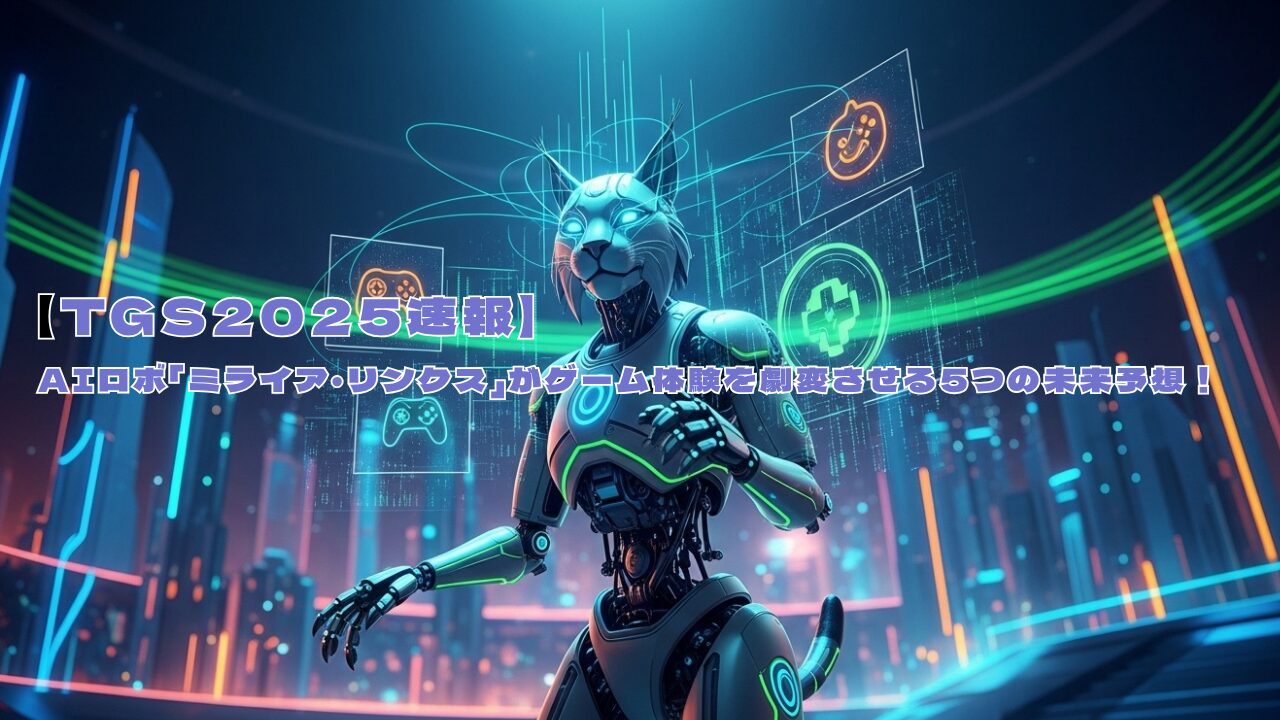【TGS2025速報】AIロボ「ミライア・リンクス」がゲーム体験を劇変させる5つの未来予想!
2025年、東京ゲームショウ(TGS2025)の会場で、次世代のゲーム体験を予感させる衝撃的な発言がありました。それは、大阪・関西万博で健康測定に活用されるAIコンシェルジュロボット「ミライア・リンクス」が、ゲーム業界において全く新しいインタラクションやサービスを提供する可能性を示唆するというものです。
健康分野での活用が注目されていたAIロボが、なぜ今、世界有数のゲームイベントでその役割を語られたのでしょうか? このニュースは、AI技術がエンターテインメントの最前線であるゲーム分野に、いかに深く、そして革命的に影響を与えようとしているかを明確に示しています。本記事では、このAIコンシェルジュロボがゲーム業界にもたらす具体的な応用可能性と、未来のゲーム体験がどのように変わるのかについて深掘りしていきます。
大阪万博からTGSへ:ミライア・リンクスが示すAIの進化
「ミライア・リンクス」は、大阪・関西万博で来場者の健康状態を測定し、パーソナライズされた情報を提供する役割を担うことで注目を集めています。その核となるのは、高度なAIによるユーザーの状態理解と、それに合わせた最適な情報提供能力です。この「個に寄り添うAI」というコンセプトは、ゲーム業界においても計り知れない価値を持ちます。
TGS2025での言及は、単に健康測定ロボットがゲーム会場に登場するという以上の意味合いを持ちます。それは、万博で培われたAIによるユーザー分析、個別最適化、そして自然なコミュニケーション能力といった技術が、そのままゲームの世界に応用され、プレイヤー一人ひとりの体験をかつてないほど豊かにする可能性を示唆しているのです。例えば、プレイヤーの感情や習熟度をリアルタイムで把握し、それに応じてゲーム体験を動的に変化させるといった、SFのような世界が現実のものとなるかもしれません。
ゲーム業界におけるAIコンシェルジュロボの具体的な応用可能性
AIコンシェルジュロボがゲーム業界にもたらす変革は多岐にわたります。ここでは、特に期待される5つの具体的な応用可能性について詳しく見ていきましょう。
- 1. 個別化されたゲーム体験の提供
AIはプレイヤーのプレイスタイル、スキルレベル、好みを学習し、ゲームの難易度、ストーリー展開、キャラクターの対話内容、さらには推奨されるクエストやアイテムまでをリアルタイムでパーソナライズできます。これにより、初心者からベテランまで、あらゆるプレイヤーが「自分だけの」最適なゲーム体験を享受できるようになります。 - 2. 新しいエンゲージメントモデルの創出
ゲーム内のノンプレイヤーキャラクター(NPC)が、より高度なAIを搭載することで、まるで生きた人間のような自然な会話や感情表現が可能になります。プレイヤーの行動や選択に応じてNPCが賢く反応し、予測不能なインタラクションが生まれることで、ゲーム世界への没入感が飛躍的に向上するでしょう。仮想空間におけるAIパートナーとしての役割も期待されます。 - 3. リアルタイムでのゲームアシストとコーチング
AIコンシェルジュロボは、プレイヤーがゲームで行き詰まった際に、ヒントや攻略法を適切なタイミングで提供することができます。eスポーツの分野では、個々のプレイヤーのプレイデータを分析し、弱点の克服や戦略立案をサポートするAIコーチングが現実のものとなるかもしれません。 - 4. ゲーム開発と運用の効率化
開発段階では、AIが膨大なデータを分析してゲームバランスの調整やバグの特定を支援し、テストプレイの効率を大幅に向上させます。また、ライブサービス型ゲームの運用においては、プレイヤーのフィードバックや行動パターンをAIが分析し、イベントの企画やコンテンツアップデートの方向性を提案するなど、運営チームの強力な助けとなるでしょう。 - 5. ユーザーサポートとコミュニティ形成の強化
ゲームに関する問い合わせ対応やトラブルシューティングをAIロボットが担うことで、プレイヤーはいつでも迅速なサポートを受けられるようになります。また、ゲーム内イベントの告知やコミュニティ活動への誘導を個別最適化することで、より活発なコミュニティ形成に貢献し、プレイヤー間のエンゲージメントを高めることも可能です。
AIとゲームの未来を拓く挑戦
TGS2025で示唆されたAIコンシェルジュロボットの可能性は、ゲーム業界に革命的な変化をもたらすでしょう。しかし、その実現には、倫理的な課題、データプライバシーの保護、高度なAIの開発コストなど、乗り越えるべきハードルも存在します。
それでも、大阪・関西万博で培われる「ミライア・リンクス」のようなAI技術が、ゲームというエンターテインメントのフロンティアと融合することで、私たちはこれまで想像もしなかったような、深く、パーソナルで、そして感動的なゲーム体験を手にすることになるはずです。TGS2025でのこの言及は、単なる未来のビジョンではなく、すでに動き出している革新の兆しと言えるでしょう。
今後のAI技術の進化と、それがゲーム業界にどのような具体的な影響を与えていくのか、引き続き注目していきたいTGS2025の最重要トピックの一つです。
AI Concierge Robots: How Miraia Lynks at TGS2025 Signaled a New Era for Gaming
The Tokyo Game Show (TGS) 2025, a global epicenter for gaming innovation, unveiled a future where the lines between digital and physical interactions are blurring at an unprecedented pace. Among the myriad of advancements showcased, a particular buzz revolved around the potential gaming industry applications of AI concierge robots, notably exemplified by “Miraia Lynks.” Originally deployed for health measurements at the Osaka Expo, the discussions at TGS2025 suggested that such AI entities are poised to revolutionize how we experience and interact with video games.
Miraia Lynks: A Blueprint for Future Interaction from Osaka Expo
Miraia Lynks, a next-generation AI concierge robot, made its debut at Expo 2025 in Osaka, specifically within the Osaka Healthcare Pavilion, dubbed the “Nest for Reborn.” Its primary function there was to seamlessly integrate communication, hospitality, and contactless health monitoring. Equipped with advanced digital human technology, Miraia Lynks offered multilingual support, engaged in interactive conversations, and provided personalized exchanges tailored to visitors’ interests. A standout feature was its non-contact biometric analysis system, capable of checking vital signs like heart rate, blood pressure, blood oxygen, blood glucose, and lactate levels, with results displayed in real-time. This innovative application positioned Miraia Lynks not just as a guide but as a holistic wellness companion, encouraging visitors to reflect on their health and well-being. The Osaka Healthcare Pavilion utilized AI, sensors, and robot suits to allow visitors to experience future health concepts, converting collected health data into avatars that visualize one’s future self—a testament to AI’s potential in predictive medicine.
TGS2025: AI Takes Center Stage in Gaming’s Evolution
TGS2025 underscored a significant shift within the gaming industry, with artificial intelligence emerging as a “new competitive battleground.” According to a survey conducted by the Computer Entertainment Supplier’s Association (CESA), the organization behind the Tokyo Game Show, over 51% of Japanese game developers are actively integrating AI into their production processes. This widespread adoption spans various aspects of game development, including visual asset creation, story and text generation, programming support, and even the development of in-house game engines. Developers largely view AI as a supportive tool that augments human creativity, rather than replacing it, fostering innovation in storytelling and gameplay.
Bridging Worlds: Miraia Lynks’ Potential in Gaming
The capabilities demonstrated by Miraia Lynks at the Osaka Expo offer fascinating insights into how AI concierge robots could redefine the gaming landscape, a potential vigorously discussed at TGS2025. This integration promises more immersive, personalized, and interactive experiences for players globally.
Dynamic NPCs and Personalized Interactions
Imagine game characters (NPCs) imbued with the conversational prowess and adaptive intelligence of Miraia Lynks. These NPCs could move beyond pre-scripted dialogues, offering truly dynamic and context-aware interactions. An AI concierge NPC could remember player choices, adapt its personality, and even react with a range of emotions and strategies, making the game world feel significantly more alive and responsive. This could lead to richer narratives, where storylines evolve based on individual player interactions, and quests are dynamically generated to suit a player’s unique playstyle and preferences.
Health and Wellness Integration in Gameplay
The health monitoring capabilities of Miraia Lynks could introduce entirely new gameplay mechanics. Fitness-oriented games could use real-time biometric data to dynamically adjust challenges, ensuring workouts are always optimized for the player’s current physical state. Role-playing games might incorporate in-game consequences or benefits based on a character’s “virtual” health, mirroring the robot’s health-tracking functions. This creates a compelling bridge between physical well-being and digital adventures.
The Ultimate AI Concierge for Gamers
Beyond in-game characters, AI concierge robots could act as true “digital concierges” for the gaming experience itself. By analyzing player behavior, preferences, and performance, AI algorithms can tailor various aspects of the game, such as difficulty levels, in-game rewards, and even narrative arcs. This personalization could extend to recommending new games, optimizing in-game economies based on player habits, and offering real-time assistance, ensuring players always find content relevant to their interests.
Challenges and the Human Touch
While the prospects are exciting, the integration of advanced AI like Miraia Lynks into gaming also presents challenges. Concerns around data privacy, ethical AI development, and ensuring AI complements, rather than diminishes, the human creative element remain paramount. The industry must strive to find a balance, leveraging AI’s power to enhance experiences without losing the essential human touch that makes games resonate deeply with players.
The Road Ahead
The discussions at TGS2025, sparked by the innovative design of robots like Miraia Lynks, signal a clear trajectory for the gaming industry. As AI technology continues its rapid evolution, the fusion of intelligent concierge services with interactive entertainment promises to unlock unprecedented levels of immersion, personalization, and engagement. The future of gaming is not just about playing; it’s about experiencing worlds that understand, adapt to, and perhaps even care for us, guided by the intelligent hand of AI.



